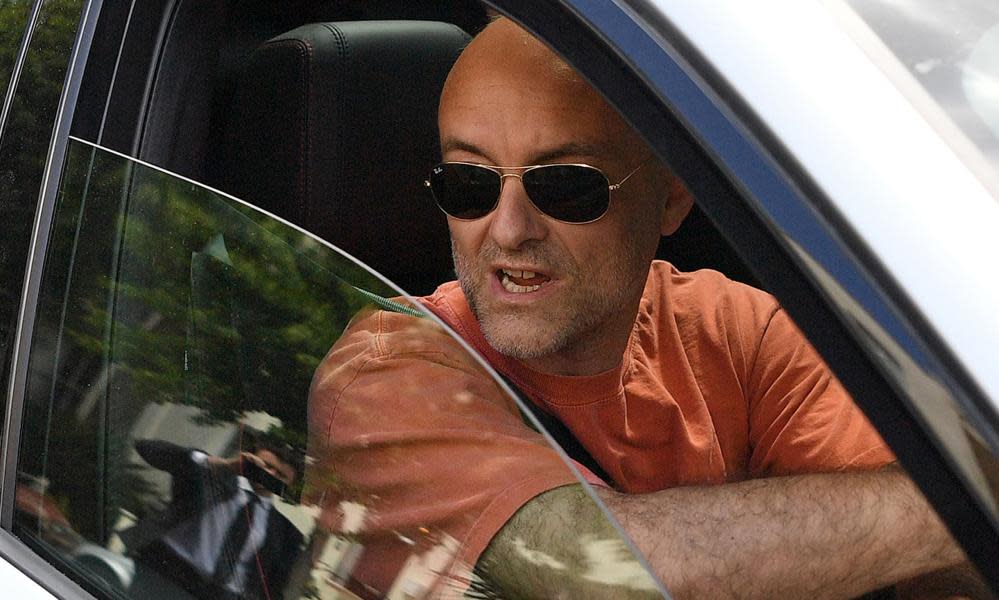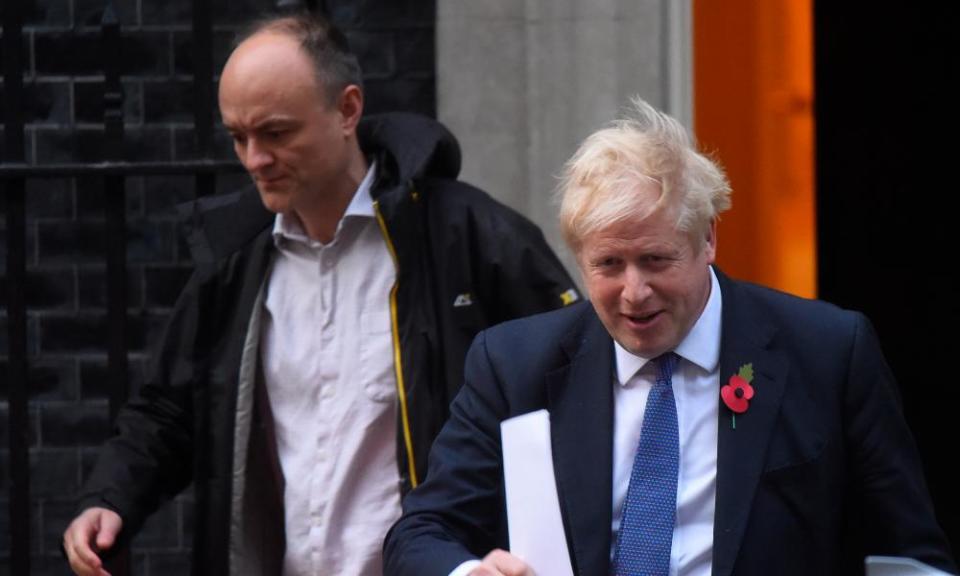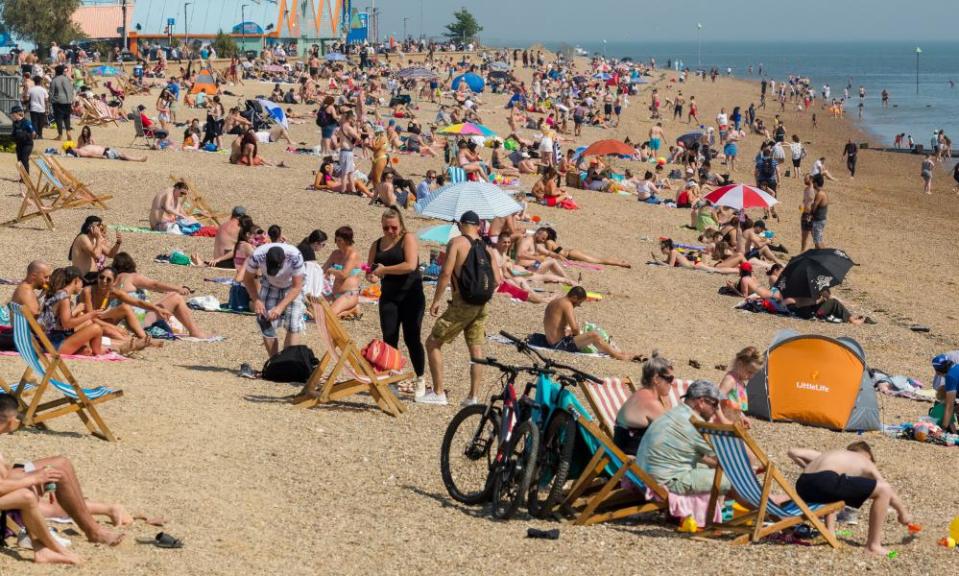In private, Tories were dismayed. In public, they rallied to save Dominic Cummings

It was Mother’s Day – 22 March – and as Covid-19 spread across the country, Boris Johnson was urging families not to mark the occasion as normal. “This Mothering Sunday,” he said, “the single best present we can give – we who owe our mothers so much – is to spare them the risk of catching a dangerous disease. The sad news is that that means staying away. This time the best thing is to ring her, video-call her or Skype her – but avoid any unnecessary physical contact or proximity.”
The following day Johnson imposed a full lockdown on the country. Pubs and restaurants had to close. Johnson banned all but essential travel. The message was crystal clear, and was repeated day after day by government ministers. It was to stay at home wherever possible, however painful and difficult doing so might seem.
For weeks beforehand, those suffering symptoms of coronavirus had been ordered to self-isolate, as had anyone with whom they had come into contact. The police had been given powers to impose fines on those flouting the rules. Adults up and down the country stayed away from their parents and grandparents, however old and vulnerable they were. Lockdown was a national sacrifice that had to be made – by everyone.
Yet some time the following weekend – 28/29 March – Johnson’s closest adviser Dominic Cummings, his wife Mary Wakefield, a journalist who was already suffering from Covid-19 symptoms, and their young child, drove more than 250 miles from their London home to the farm where Cummings’s parents live near Durham. Over that weekend Cummings also developed symptoms and became very ill.
Related: Dominic Cummings, coronavirus and lockdown – a timeline
Without revealing their location and that they had ever left London, Wakefield would later give an account of her husband’s Covid-19 experience in an article for the Spectator. “Dom couldn’t get out of bed. Day in, day out for 10 days he lay doggo with a high fever and spasms.” Cummings wrote of his illness too saying: “At the end of March and for the first two weeks of April I was ill, so we were both shut in together.” Wakefield recalled that when they had both shaken off the virus “we emerged from quarantine into the almost comical uncertainty of London lockdown” – a statement her readers could have been forgiven for thinking meant they had never left the capital at all.
Late on Friday evening, however, people learned otherwise when the Guardian and Daily Mirror jointly broke the story of the Cummings family’s trip north at the height of the lockdown. The papers also revealed that Durham police had approached Cummings when he was standing near the gate of his parents’ home with a young child, believed to be his son, five days after an initial complaint had been made to them about his presence in or near the city. A neighbour told the papers of the sighting. “I got the shock of my life, as I looked over to the gates and saw him. I recognised Dominic Cummings – he’s a very distinctive figure.”
Similar examples of public officials flouting lockdown guidelines have led to swift resignations with senior Conservatives leading choruses of condemnation. When Professor Neil Ferguson, the leading epidemiologist, quit as a member of the Scientific Advisory Group for Emergencies (Sage) after admitting he had been visited by his girlfriend, the health secretary, Matt Hancock, said he was “speechless” and made much of his willingness to help the police with any inquiries they might make.
But this time if Conservative ministers, MPs and No 10 staff were shocked they tried their damnedest not to show it. They took time marshalling defensive lines to save the most powerful and feared man in Whitehall, after Johnson himself. For 14 hours after the revelations caused a storm on social media the government machine seemed stunned into silence. Only a few “friends” of Cummings tried to fight back with anonymous comments. Cummings himself can normally spin his way quickly out of the tightest of corners but even he was slow to react.

By mid-morning on Saturday, however, as calls grew from opposition MPs for him to quit, No 10 began its fightback. No, he would not resign under any circumstances. In fact the message was more that what Cummings had done deserved respect, and was well within the rules. Officials highlighted a part of government lockdown advice which said people could leave home in exceptional circumstances including to “provide care or help for a vulnerable person” – while failing to mention all the other parts which suggested they should have stayed put with their child. The evolving defensive argument was that Cummings’s child had needed to be cared for as the parents were suffering or about to suffer from Covid-19.
With Labour demanding an urgent statement and clarity, the cabinet suddenly began to sing with one voice and rallied round Johnson’s man. Minister for the Cabinet Office Michael Gove, who used to employ Cummings and defends him at every turn, spoke out suggesting those who questioned the controversial adviser were the unthoughtful ones: “Caring for your wife and child is not a crime,” he said. Fellow senior cabinet colleagues, the foreign secretary, Dominic Raab, and the chancellor, Rishi Sunak, also weighed in in harmony. “Taking care of your wife and young child is justifiable and reasonable, trying to score political points over it isn’t,” Sunak tweeted.
The script was now decided and No 10 issued a statement saying: “Owing to his wife being infected with suspected coronavirus and the high likelihood that he would himself become unwell, it was essential for Dominic Cummings to ensure his young child could be properly cared for.
“His sister and nieces had volunteered to help so he went to a house near to but separate from his extended family in case their help was needed.
“His sister shopped for the family and left everything outside.
“At no stage was he or his family spoken to by the police about this matter, as is being reported.
“His actions were in line with coronavirus guidelines. Mr Cummings believes he behaved reasonably and legally.”
But privately many Tory MPs and ministers were dismayed. The police, while cautious in public, were in private clearly furious. Scientists were incredulous and civil servants confided fears that Cummings was completely out of control. One senior mandarin said the cabinet secretary Mark Sedwill should investigate whether Cummings had breached the civil service code by so clearly going against the spirit of government policy, at a time of and on a matter of, national emergency. “Someone should be asking if Cummings’s behaviour was consistent with the civil service code, and if not what are they going to do about it?” said the civil servant.
Ministers have clearly been told to tweet support for Cummings. What price conscience? Or integrity?
Nick Baines, bishop of Leeds
Durham’s acting police and crime commissioner, Steve White, whose force’s account of events was being challenged by No 10, said: “Given the whole ethos of the guidance and regulations issued from the government was to reduce the spread, regardless of reason, by travelling to County Durham when known to be infected was most unwise.”
University College London professor Susan Michie, a member of Sage, told Sky News there was no question that what Cummings had done broke the guidance. “It appears that three rules have been broken. One is leaving the house when you’re symptomatic, another is travelling far distances and staying overnight elsewhere, and the third is having a person – in this case a child – go from one household to another household. The problem about having different rules for different people is that it breaks the trust of the people in those who are issuing the guidelines.”
Dean Burnett of Cardiff University took a similar view. “What Dominic Cummings did was utterly reckless. He knew he could have been infected with Covid-19, yet he drove more than 200 miles to his parents’ house. They are in their 70s, the most vulnerable group. It is utterly bewildering.
“This is a man who is on the Sage committee and who is influencing government policy on Covid-19 and he behaves like this. It is unacceptable. He should resign.”
Burnett added that his own father had died of Covid-19 but he had still respected the rules of lockdown. “I could not comfort my father as he died and have had to grieve for him on my own. Like the rest of my family, I respected the rules of lockdown. Yet the man who has had key influence in setting up those rules seems to be quite happy to ignore them when it suits him. It is infuriating.”
In an attempt to turn the heat on to Johnson himself Labour also demanded to know who in Downing Street had known about Cummings’s progress to the north, after officials said several people in No 10 had been aware he had left London, though none had said so before yesterday.
Last night as new claims emerged in the Observer about further sightings of Cummings in different locations near Durham, it is clear the prime minister and Tory ministers are united in trying to defend him and keep him in post come what may.
But while it would be a humiliation and a severe embarrassment for Johnson to lose Cummings, there are big dangers in keeping him too. This weekend the police are trying to manage expected bank holiday crowds at a time when many people already believe the lockdown is effectively over. They are in danger of losing the battle as their authority has been undermined.
Asked whether Cummings’s actions would make the work of officers harder, Dorset crime commissioner Martyn Underhill said: “I’m sure inevitably it will be today, because this is a breaking story and he is a very high-profile person. It is very unfortunate the timing of this, because this is going to be the busiest weekend Dorset’s seen this year in a policing sense and a tourist sense.”

More broadly there is a prospect that the whole episode will erode trust in the government, which is already on the slide, and lead people simply to ignore rules they see being flouted or bent by those at the top.
In the latest Opinium poll for the Observer this weekend, the political dangers for Boris Johnson are clear. For the first time since the Covid-19 crisis began Labour leader Keir Starmer has a higher approval rating than the prime minister for his handling of the pandemic. Some 47% of people approve of Starmer’s leadership against 45% who back Johnson’s. The government’s net approval rating (when the percentage that disapprove is subtracted from the percentage that approves) has fallen from +42% on 26 March to -4% now.
The government has opted to try to stand by Cummings. But as it faces the increasingly difficult challenge of attempting to ease the lockdown with more nuanced and complex messages, it will need the public’s support to do so.
Nick Baines, the bishop of Leeds, told the Observer that if there was seen to be one rule for those in power and another for the rest then the trust on which leadership depends would be lost.
“People across the country have sacrificed hugely in order to obey both the spirit and word of government advice. People have missed being with family members who have died,” he said. “But now we learn that there is one rule for the people and another for No 10 and the elite. Ministers have clearly been told to tweet support for Cummings. What price conscience? Or integrity? Or credibility? Or competence at a time when leadership can only be rooted in trust?”
In a crisis such as the one the country is in currently enduring, the last thing any government wants is to no longer be believed by the people it represents.

 Yahoo News
Yahoo News 
